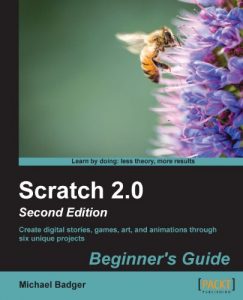About This Book
- Discover how to use the new Scratch Version 2.0 to create games, animations, and digital stories
- Six hands-on projects that get you learning by doing with projects for all ages and experience levels
- Learn universal computer programming basics with no previous programming knowledge required
Who This Book Is For
The author approaches the content with the belief that we are all teachers and that you are reading this book not only because you want to learn, but because you want to share your knowledge with others. Motivated students can pick up this book and teach themselves how to program because the book takes a simple, strategic, and structured approach to learning Scratch.
Parents can grasp the fundamentals so that they can guide their children through introductory Scratch programming exercises. It's perfect for homeschool families. Teachers of all disciplines from computer science to English can quickly get up to speed with Scratch and adapt the projects for use in the classroom.
What You Will Learn
- Program in Scratch including universal programming concepts such as loops, conditional statements, variables, arrays, Boolean logic, dynamic interaction, coordination, synchronization, threads, event handling, and procedures
- Design user interfaces including sequence, characters, and controls
- Translate a storyline or plot into an online game, animation, or story
- Debug problems and revise projects to fix problems and add functionality
- Think critically to solve problems based on need, program limitations, and knowledge levels
In Detail
As 21st century people, we live a digital life, but computer scientists around the world warn of a declining pool of digitally literate computer science students. The Scratch environment makes it fun for students of any age to think, create, and collaborate digitally.
Scratch 2.0 Beginner's Guide Second Edition will teach you how to become a Scratch programmer and lay the foundation for programming in any computer language. Whether you are creating a birthday card or cloning bricks for a game of Breakout, projects are approached in a step-by-step way to help you design, create, and reflect on each programming exercise.






